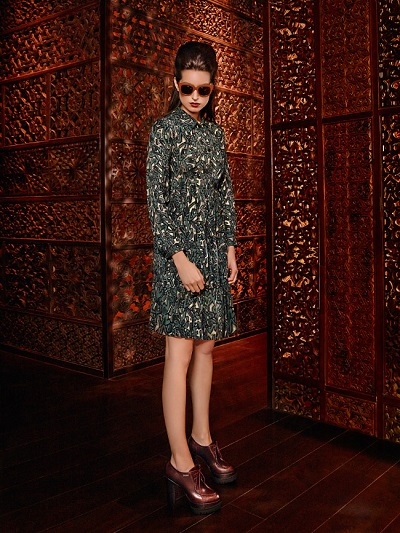Becoming a Freelance Retoucher
Going freelance is always a daunting prospect. You trade the stability of a constant paycheck for the uncertainty of making your own brand and telling the world who you are. It’s thrilling, slightly terrifying, and one of the biggest decisions you’ll make in your life.
I’ve been a professional retoucher for over five years now. Before that I’d spent a similar period of time with Photoshop and retouching through graphic design. The transition for me was an easy one — as retouchers we have a template to work from (the photo) and my design jobs that included photography were always the ones with the highest rate of client satisfaction.
That said, to build up to the point where you’re paying the mortgage, bills, and luxuries (llama rental, pig riding weekends, forklift truck racing…normal stuff) takes an extraordinary amount of dedication.
Build Your Portfolio

Retoucher: Daniel Meadows – for Grazia
I haven’t seen a better place to find freely available high-quality shots to build a first book from than Model Mayhem — if you’re here reading this then you’re in a very good place to begin. With a solid base to start from, build towards a book or two that clearly displays the direction you want to take. I don’t promote any services for weddings, for example. Although you may wish to, I’ve always politely declined batch processing jobs because I simply don’t enjoy them — my portfolio reflects my specialization. Keep your books up-to-date and drop anything that is no longer representative of your ability (full disclosure: I write this last tip as much for my own benefit as for anyone else’s. I drastically need an overhaul this summer!)
Learn the Right Skills

Retoucher: Daniel Meadows – for Grazia
There’s a lot of awful retouching advice on the internet. I can’t speak for the studios that cheaply batch the process with plugins, but I can tell you that if you develop a skill set that’s demanded by the commercial retouching industry, you’ll be surprised by the budgets set aside for post. I’m not a particular fan of the term ‘High End,’ although I’ve adopted it; ‘High End’ is the new ‘competent professional.’ The explosion of interest in the cheaper end of the market moved the bar.
Cutting corners, saving time, and doing the bulk of your skin work with filters (including Frequency Separation blurring) will hamper your progress in the commercial field. That quick fix market is saturated, and there’ll always be someone willing to do the same thing for a dollar less. Be someone who provides a service for which paying a premium is worth it. Work on color management, your dodge and burn skills, and learn to get the best from your RAW files.
One of the best pieces of advice I can give you is this: get your inspiration from the right sources. I subscribe to one of ‘the two big’ fashion magazines, and it arrives through the door at home every month. A friend picked one up from the coffee table a few years back and told me I’d “been ripped off — it’s full of ads!” I told him that was the point. It’s easy to get drawn into competing with your peers as you learn, and that’s a sure way for the whole group to amble off the path. Make sure you’re the one who keeps an eye on the actual goal, and takes strides towards it.
Practice

Retoucher: Daniel Meadows – for Grazia
Your early work will probably be, as we say in England, absolute bobbins. If you do it the right way, it’ll probably be worse. This is because as plugins and quick fix techniques have proliferated and improved, it’s become relatively simple to achieve often adequate results for little time. For beauty work in particular it’s vital not to rely on ‘adequate’ at the expense of the hundreds of hours of dodge and burn practice you should be acquiring over the start of your career. Frequency separation is a wonderful tool, but don’t be tempted to use it as your go-to skin smoothing technique. (That remains D&B — no plugin or filter will be an adequate substitute.) The more you learn and apply to great shots with an appreciation of what a high-quality output looks like, the more proficient you’ll become.
Learn about color theory. Learn about what looks are in demand for fashion, editorial, beauty, movie posters — whatever your specialization is, know it thoroughly and learn how to apply treatments. A client might send you a mood board for reference and it’s vital to know how (and if) it can be achieved. Make sure you can balance a set of images properly taking into account hue, saturation, and contrast relative to the shadows, mids, and highlights.
Network

Retoucher: Daniel Meadows – for Harper’s Bazaar Arabia
Be seen, chat, ask questions, show off your progression as an artist and help the people following you. There are plenty of places to do this (MM is a great example). The internet has made the world a much smaller place, so use it to your advantage. A few weeks ago I was walking around Manchester, England, surrounded by huge billboards carrying a major ad campaign I’d worked on. This week I have a fashion editorial featuring my favorite assistant from Doctor Who. Both clients reached me online — you no longer have to be in a major commercial center to compete. Join forums, join groups, (I’ve started a new retouching group on Facebook that might interest you) and engage with people. Collaborate to build the quality of your portfolio and build and maintain business relationships.
Build Your Brand

Retoucher: Daniel Meadows – for Harper’s Bazaar Arabia
Your brand is you at your best. I get friend requests on my personal Facebook page that I understand to be work related, so I leave them unanswered, often politely directing them to Daniel Meadows – Retoucher instead. Daniel Meadows is a brand. Between you and me, Danny is the guy my mates know whose photographs are usually of some ridiculous night out, and who gets sweary about politics and nervous about playing guitar at open mic nights. That’s the “you” whom you can share with a small circle of clients and peers if you choose to, but keep your official pages on-brand. No dinner Instagrams, no conversations with your friend about weekend plans.
Don’t Undersell Yourself

Retoucher: Daniel Meadows – for Luis Vuitton
I can’t stress this enough. I regularly see threads on forums where someone asks if a fee that is less than a living wage is ‘too much to charge.’ You’re a businessperson and you must think like one. Sensibly speaking, if your level of work can be replicated by an amateur, then charge accordingly, and treat it as supplemental income while you build your skill set. When you’re ready to build a real business, you must charge realistic rates. Freelancers must take downtime into account. If you expect a certain annual profit (after expenses) and estimate your billable working hours will be a fraction of an average 40-hour week, then your hourly rate needs to reflect that.







January 30, 2024 at 11:36 am, lenaglamur12 said:
Thank you!
September 28, 2016 at 12:30 pm, Chris Jones said:
Hi Daniel,
Great post, thanks for taking the time to share your advice. I am a freelancer, I can retouch to a very decent standard, but I probably couldn’t call myself a ‘freelance retoucher’ just yet because I don’t have a portfolio that I would be proud enough to hawk around to potential investors of my skills. There are great sites I can get practice imagery from such as this and I do have a few very good examples. I would love to do some free work for photographers so I can build a folio. Do you have any advice for where and how to begin asking? I am in London so there is a plethora of opportunity. Many thanks.
November 04, 2015 at 1:00 pm, Sienna Coppa said:
Thanks this is really well laid out. Do you think there is a market for more artistic retouching?
May 28, 2015 at 5:42 am, RichardBee said:
Thank you for your great advice. Its meaningful. Building your own brand is important.
May 21, 2015 at 1:11 pm, alphonse23 said:
Good read. Thanks for writing it. Your work is awesome too. 🙂
Great advice for anybody really, retoucher or not.
May 22, 2015 at 2:53 am, Daniel Meadows Retouching said:
Thanks Alphonse, coming from a design background I’ve seen the gamut of freelancer trials and stumbling blocks, we all share them!